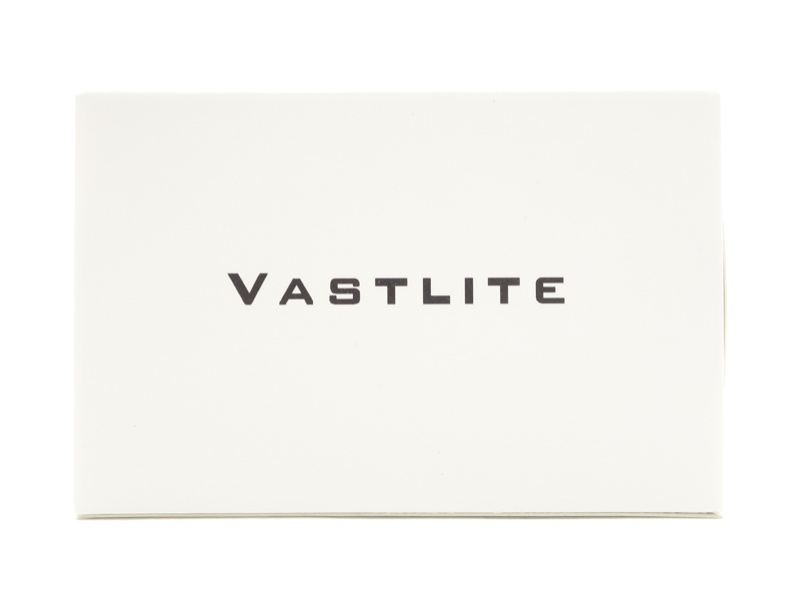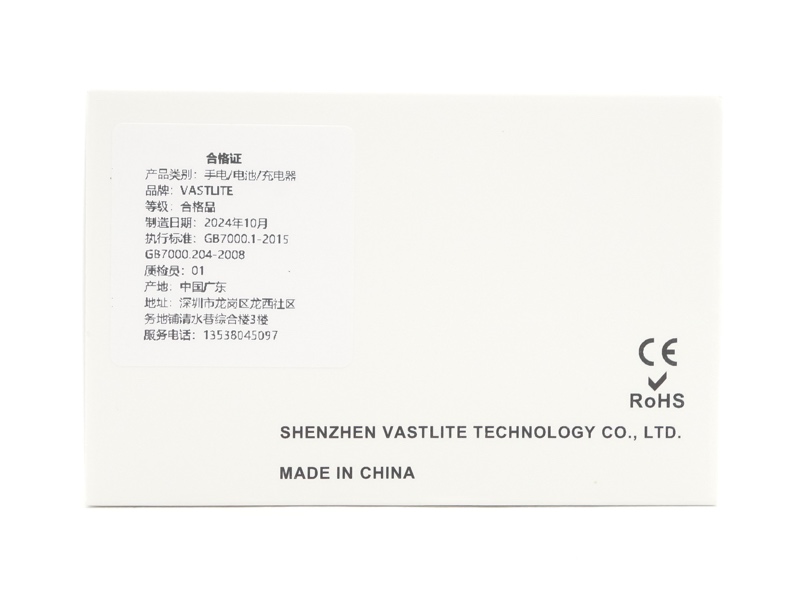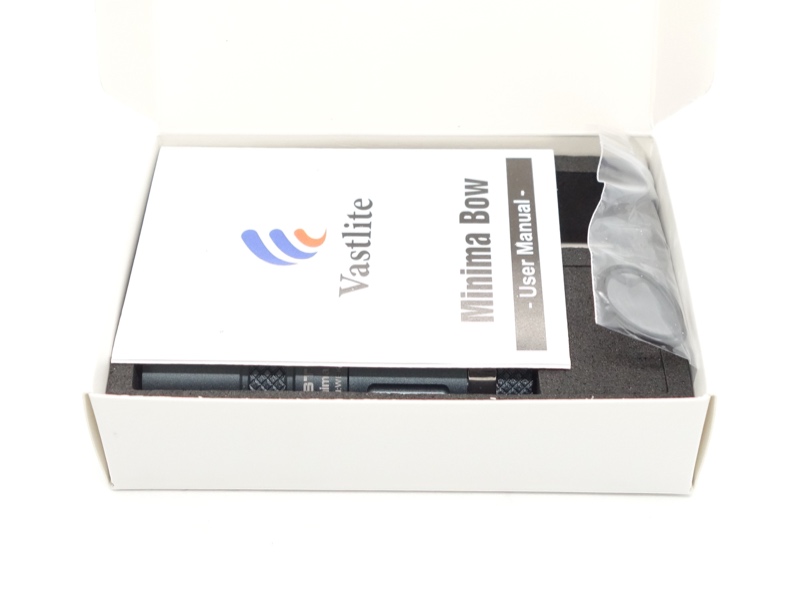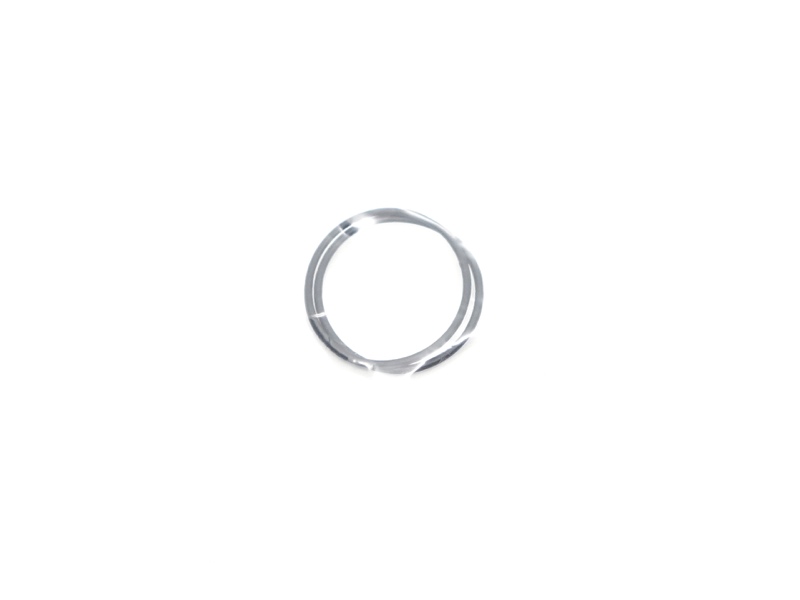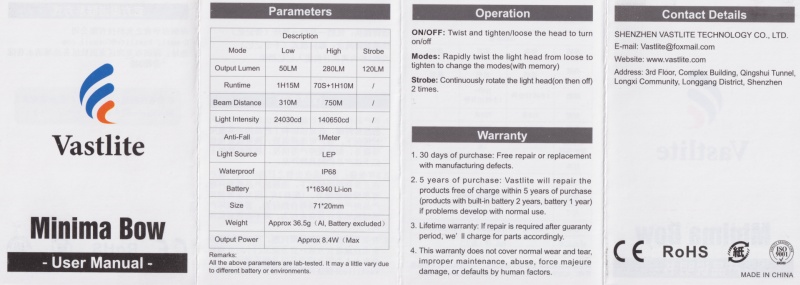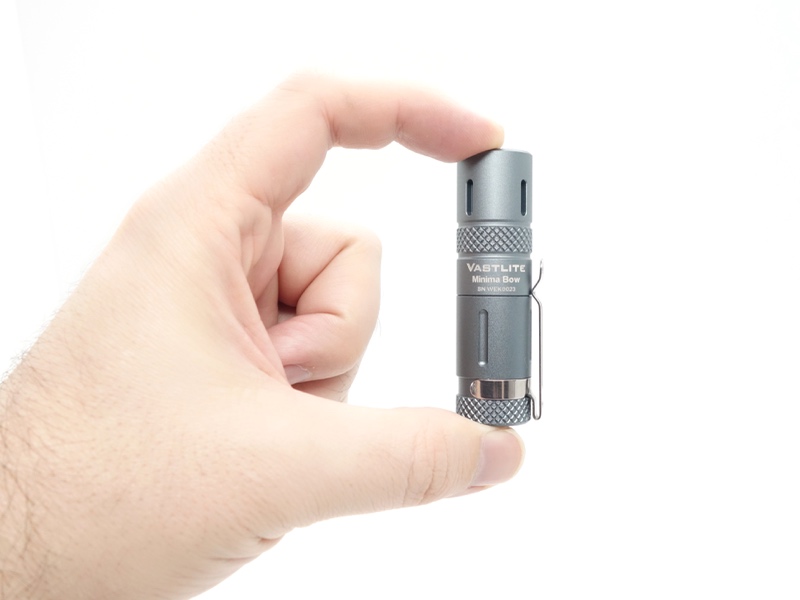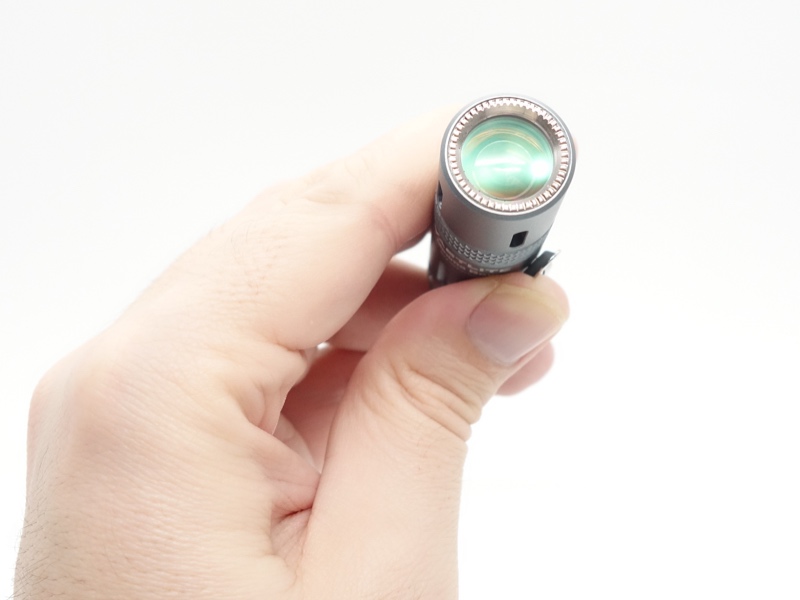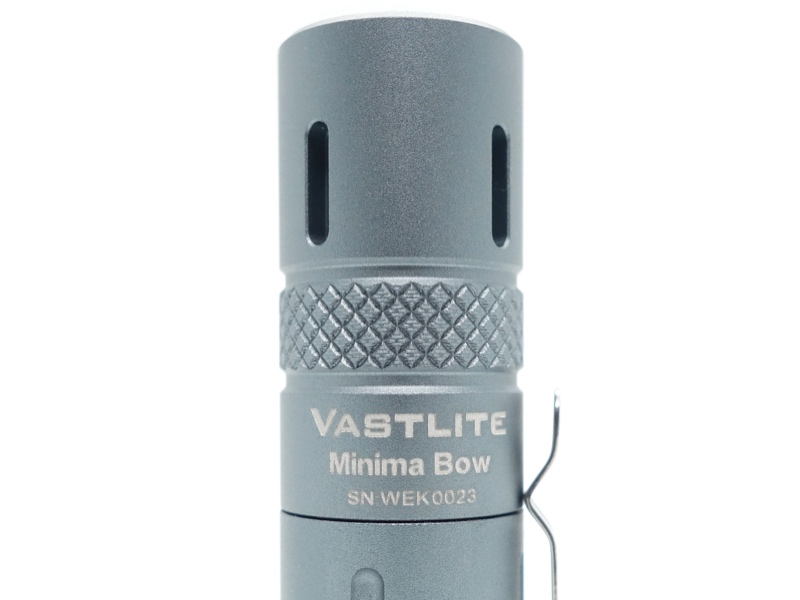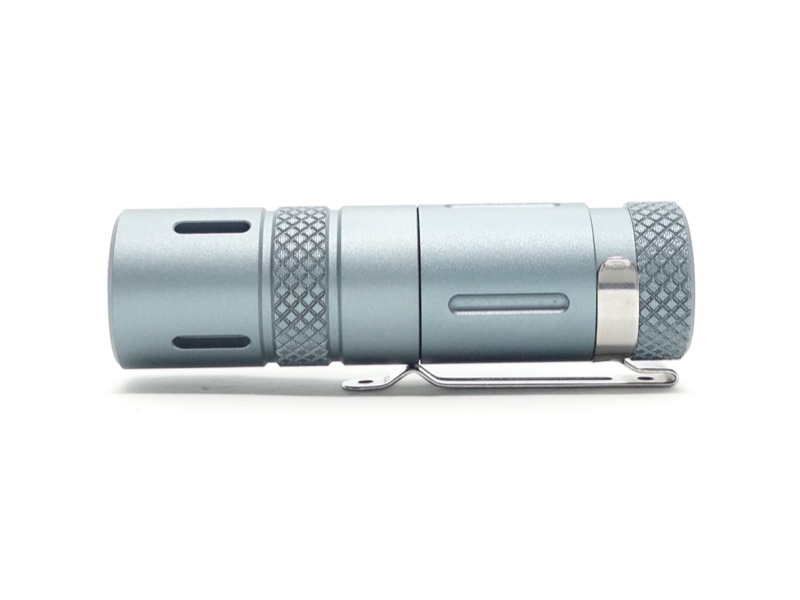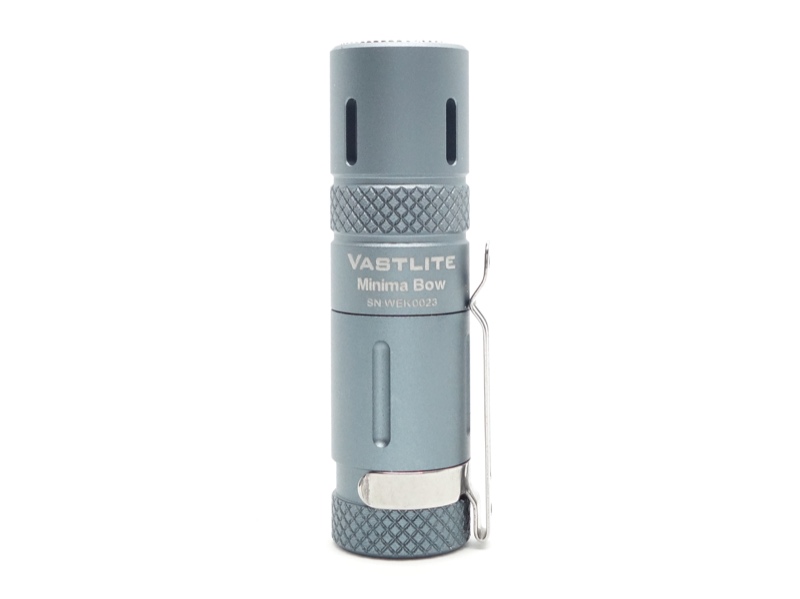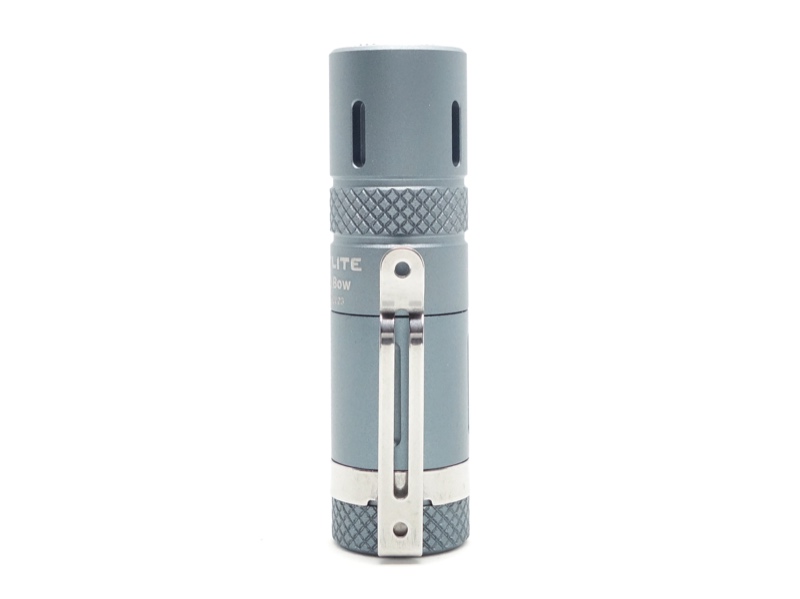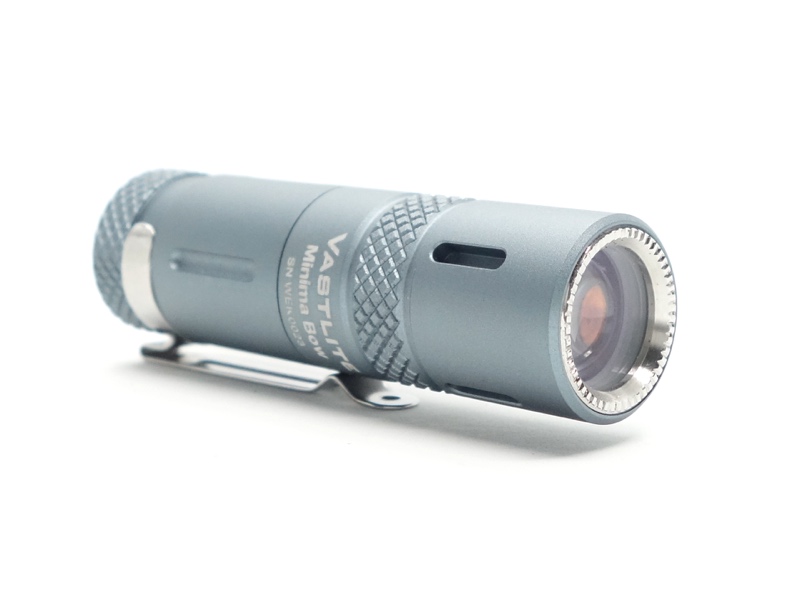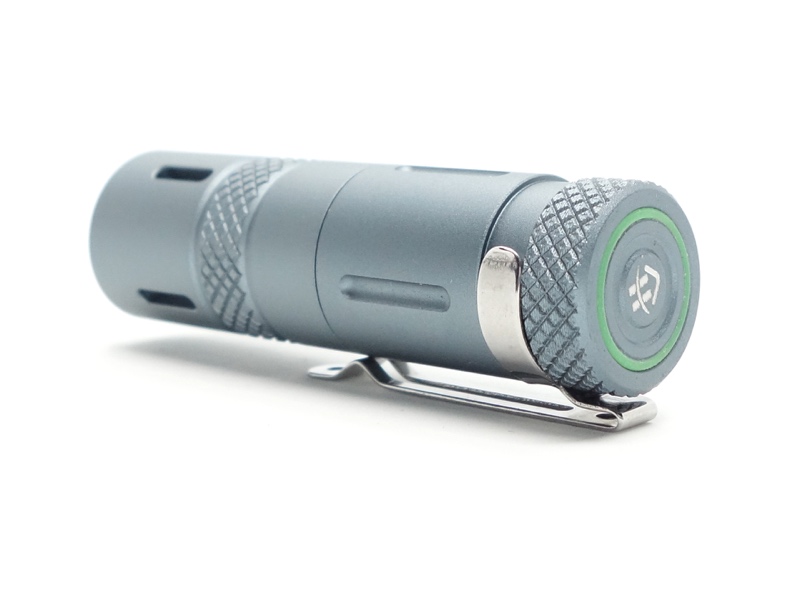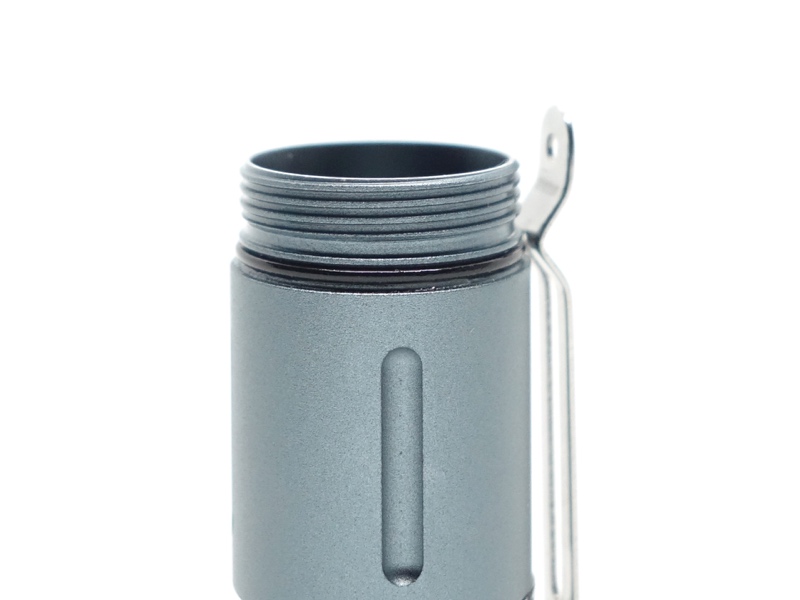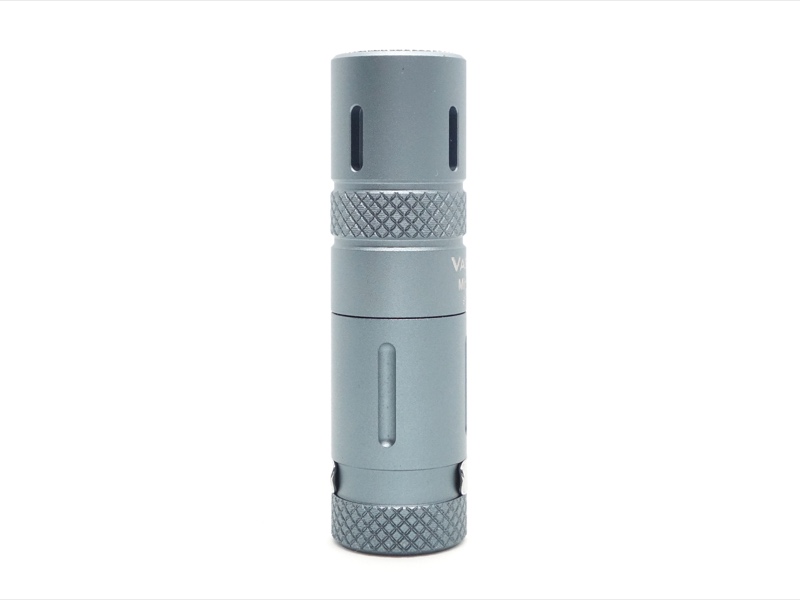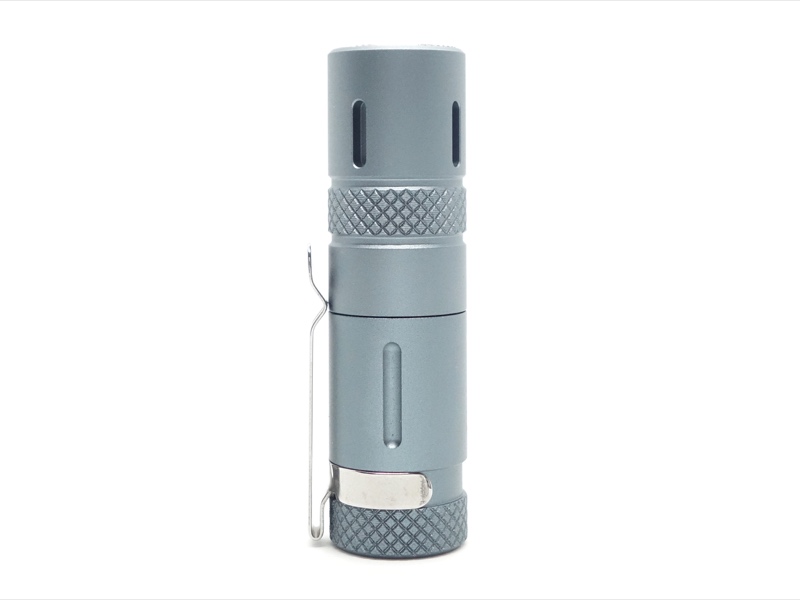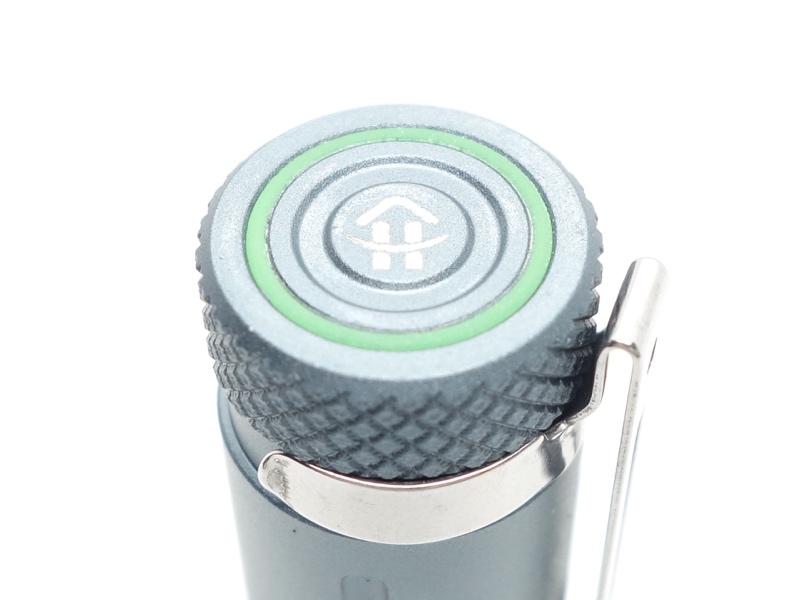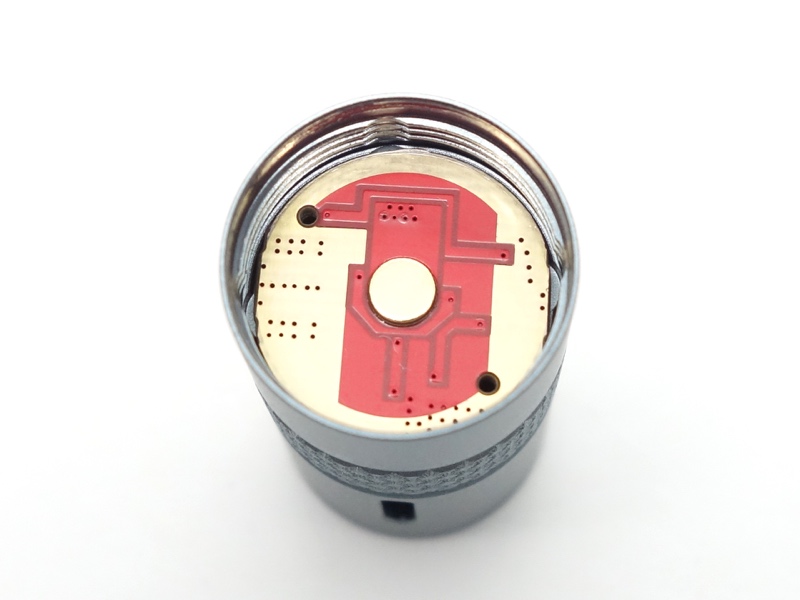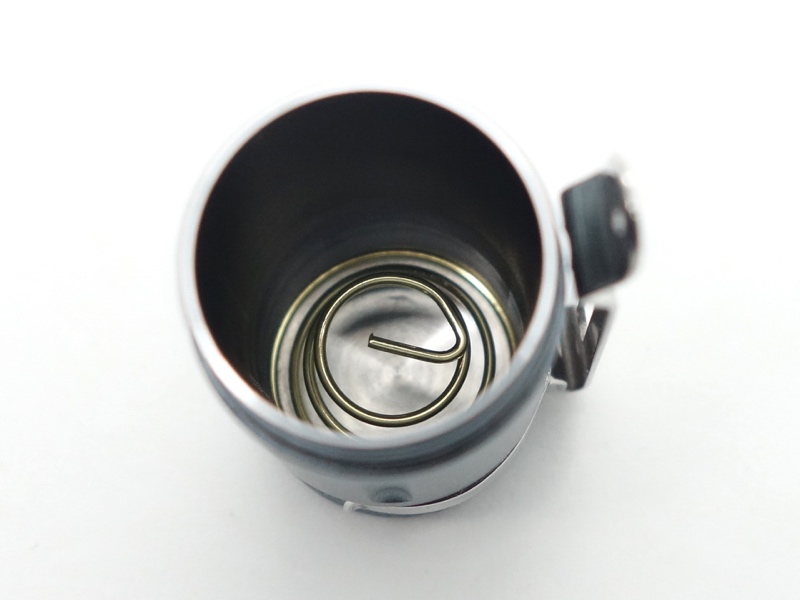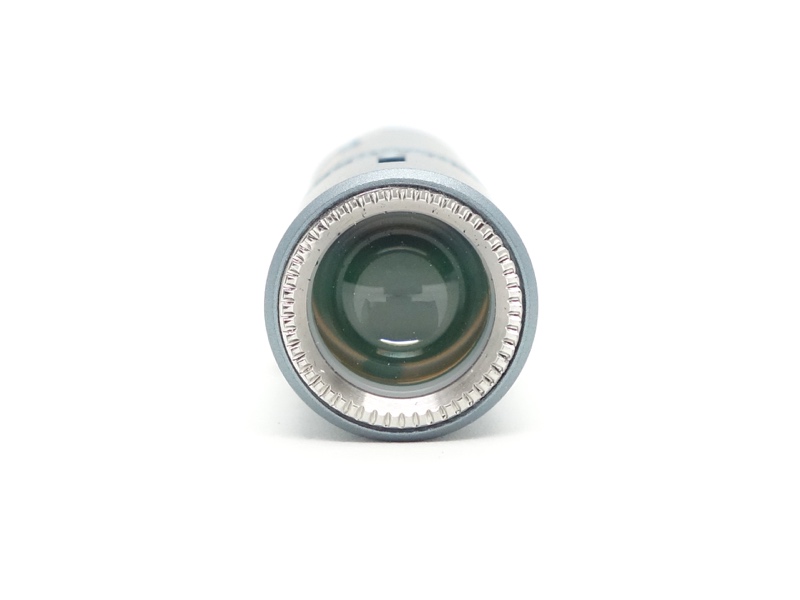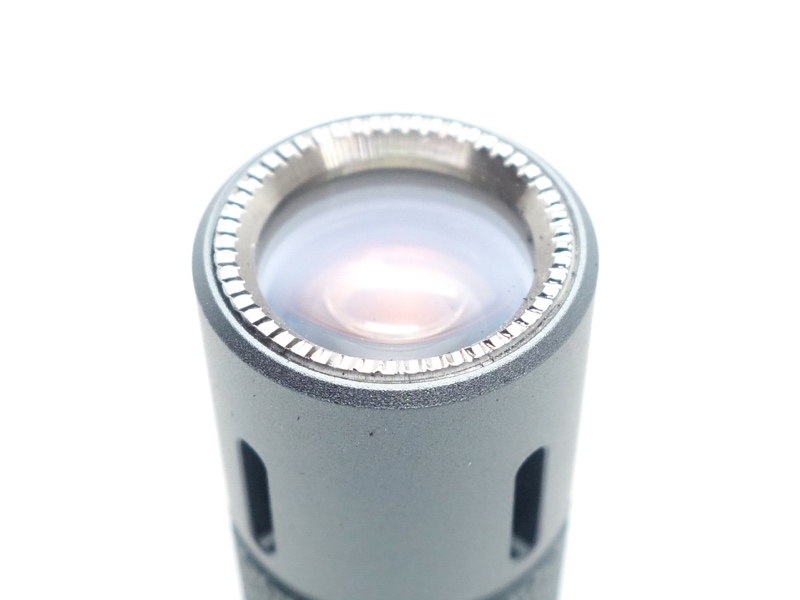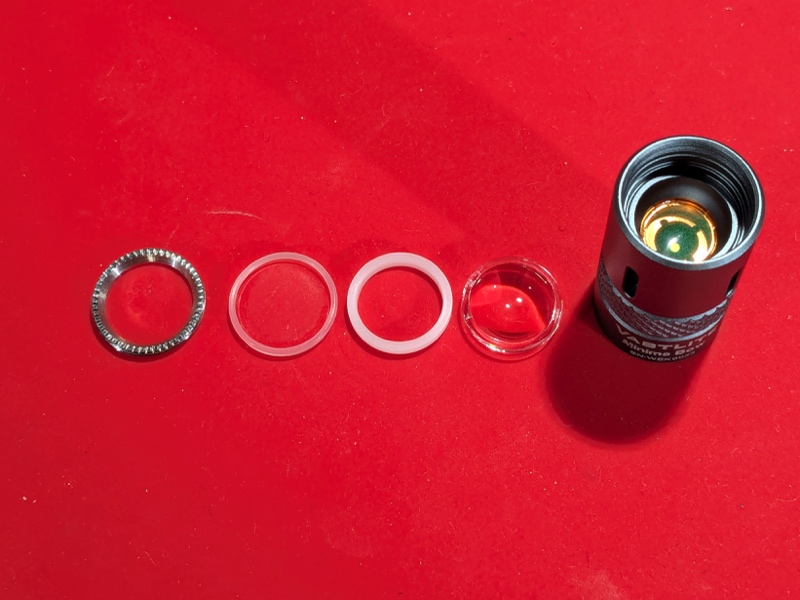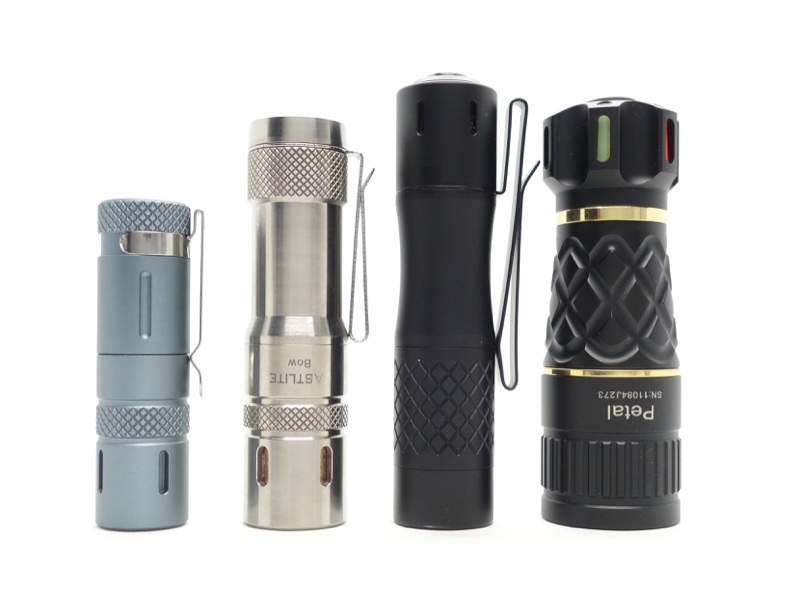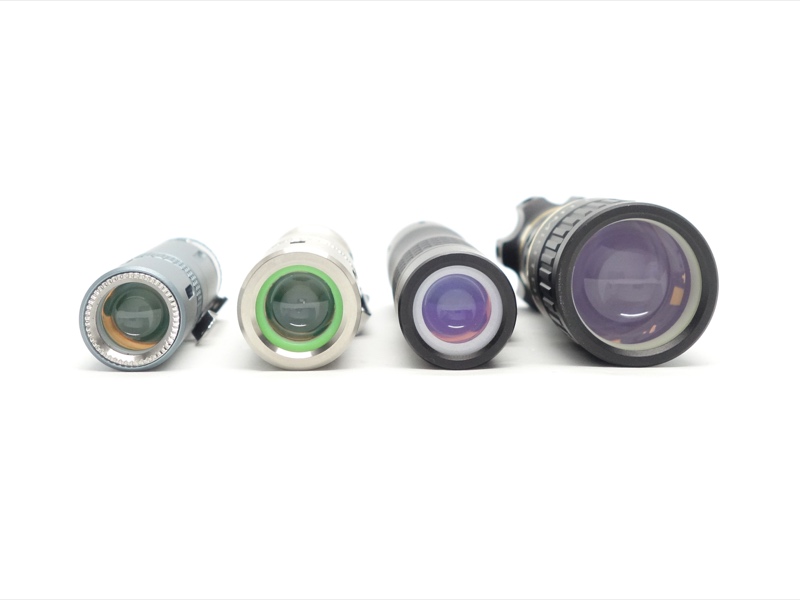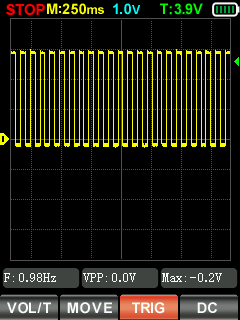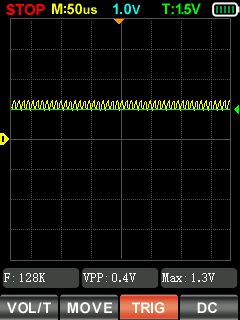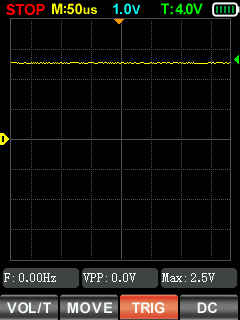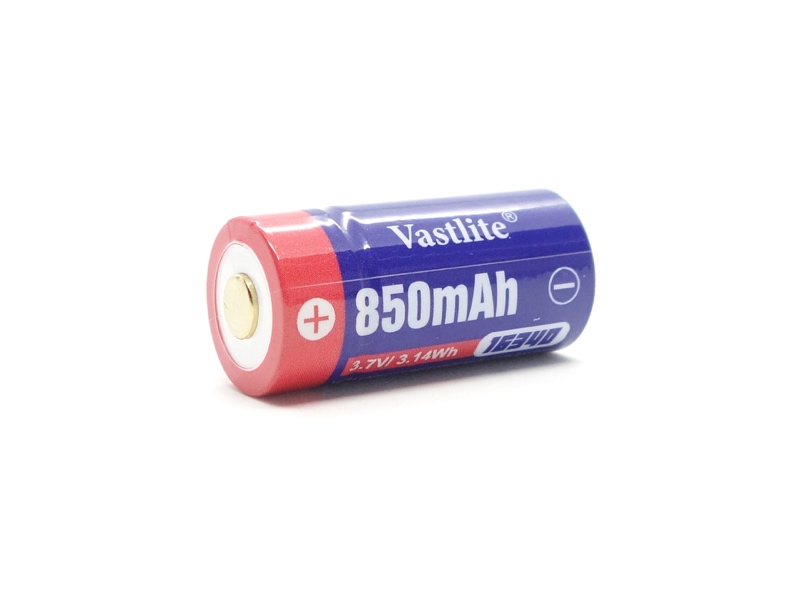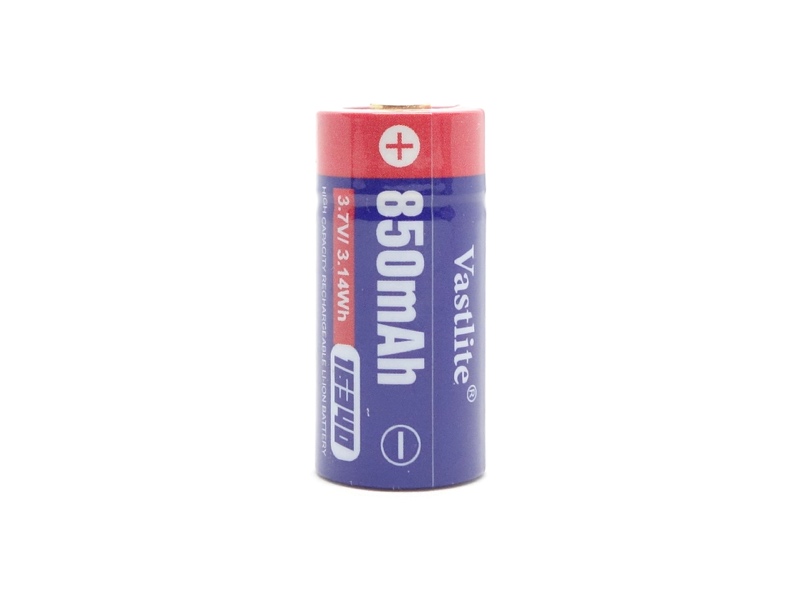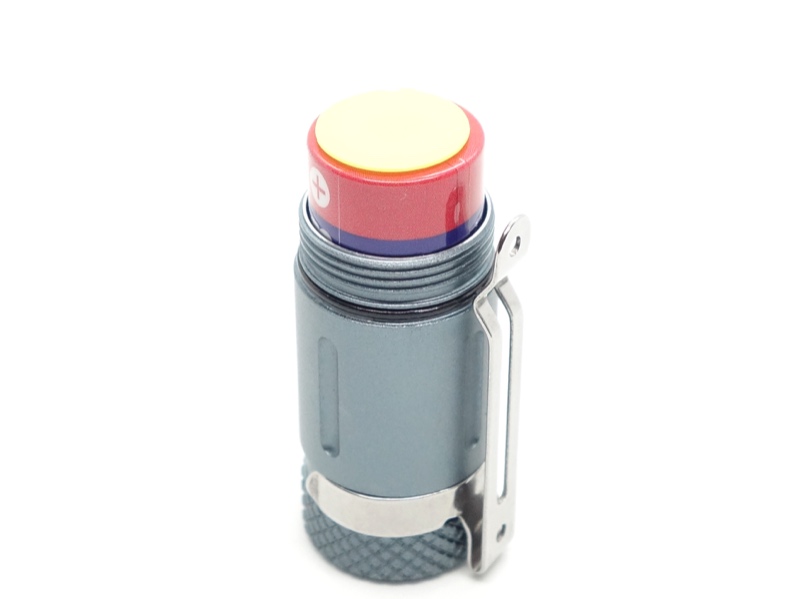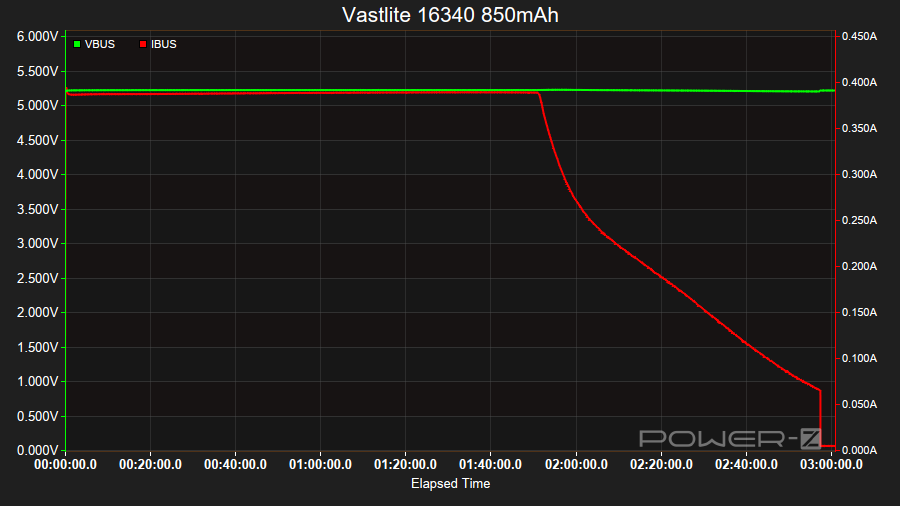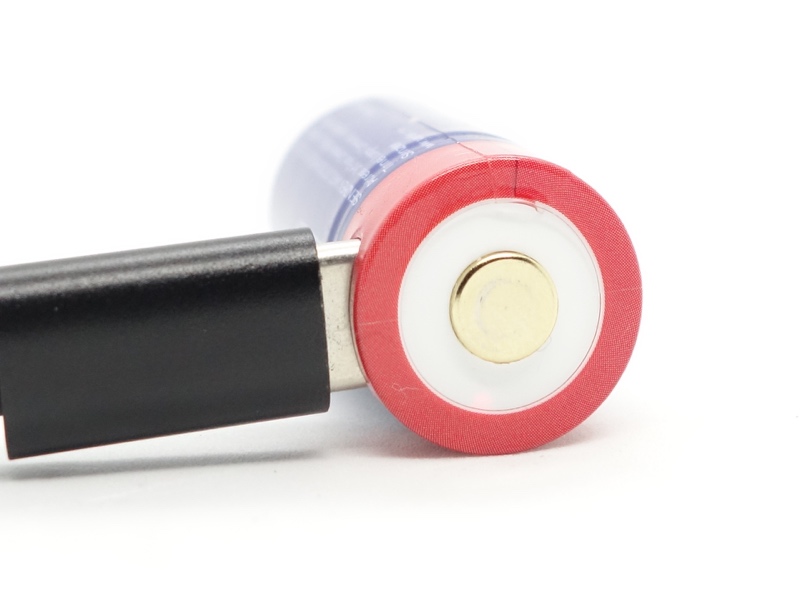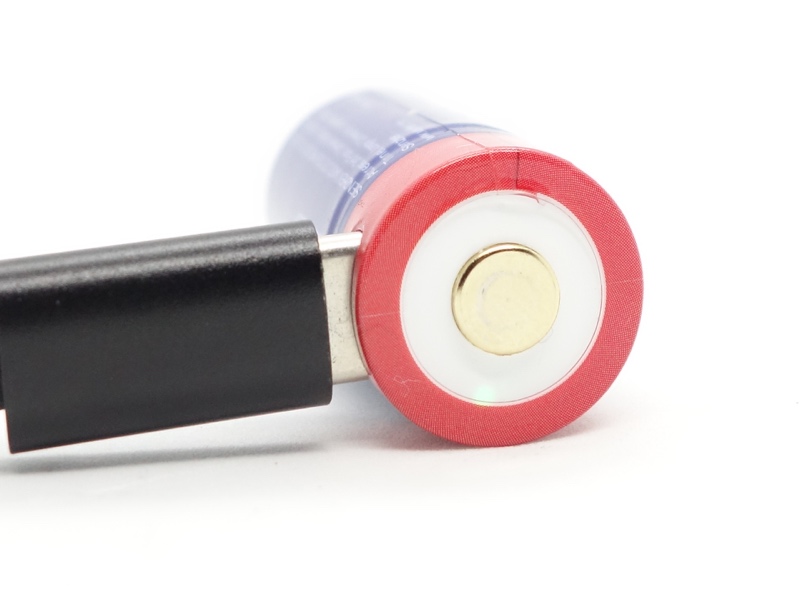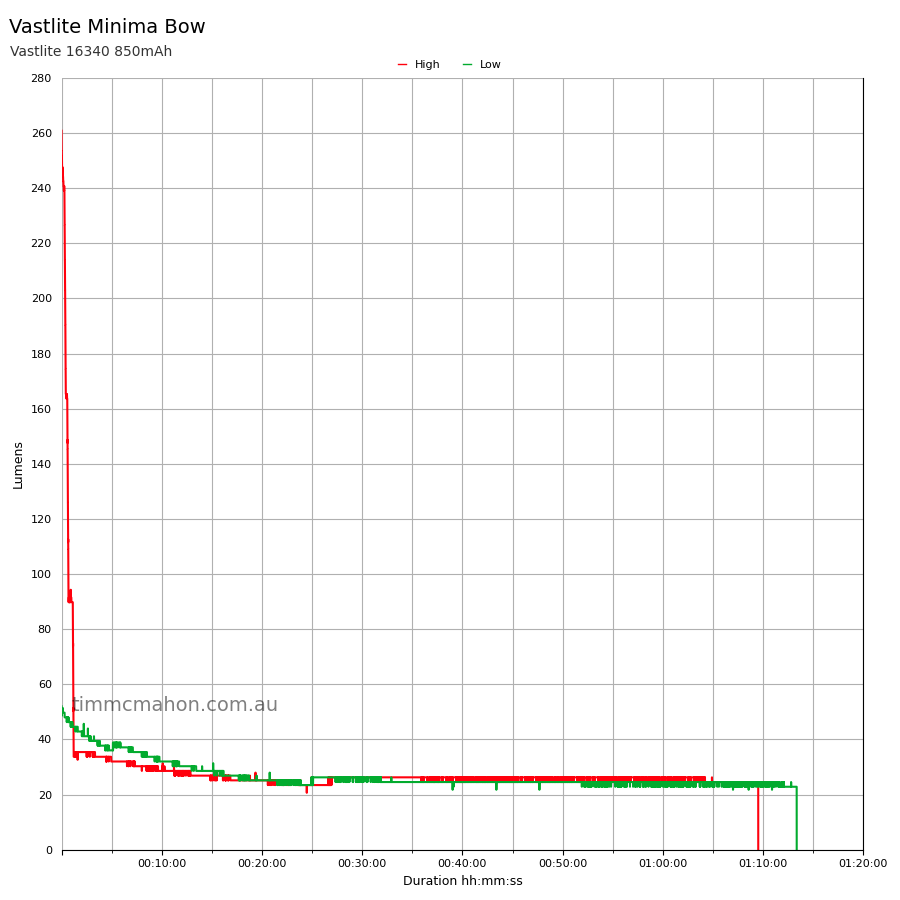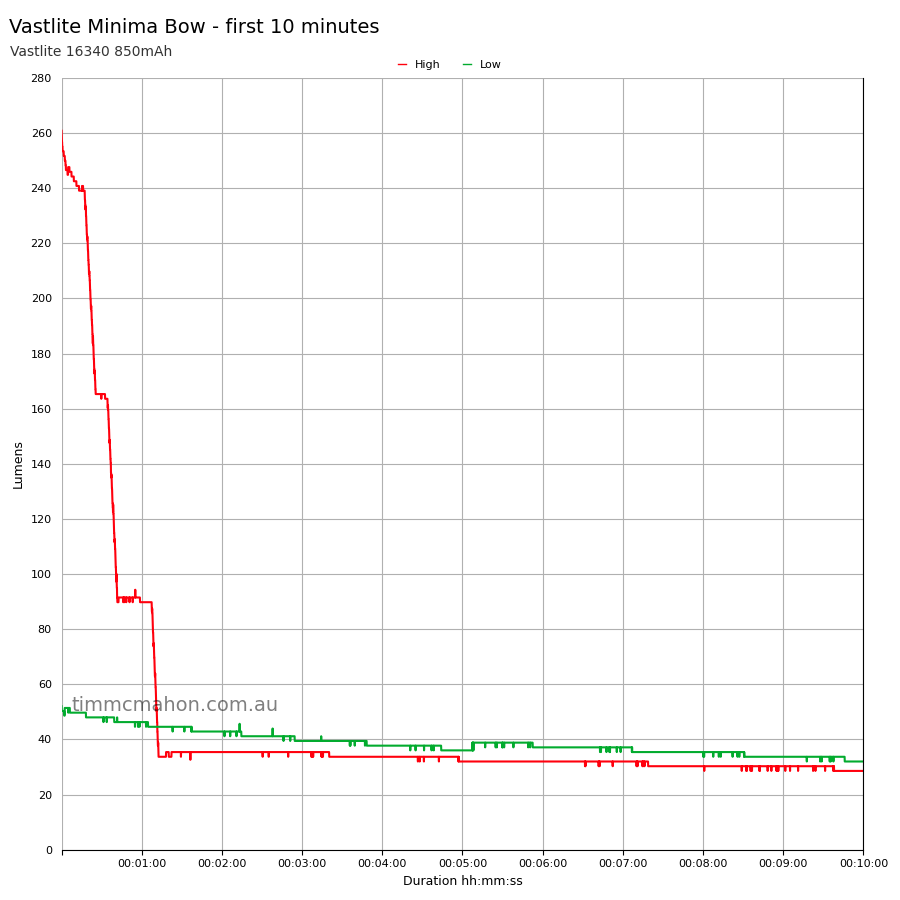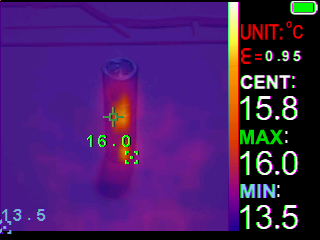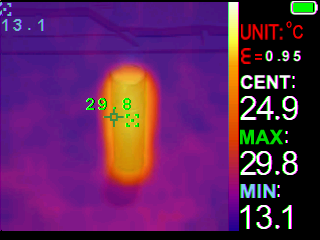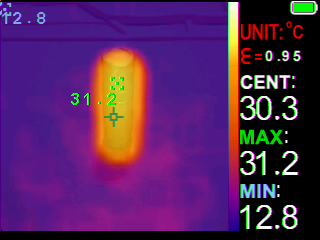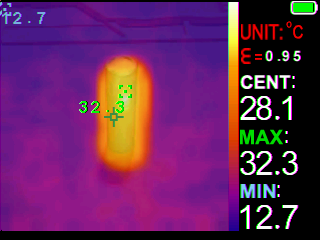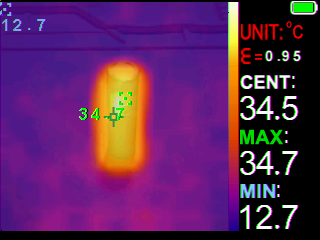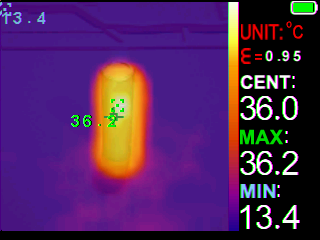World’s Smallest LEP Torch! Vastlite Minima Bow

Vastlite Minima Bow#
- Specifications
- Introduction
- Torch in use
- Build quality
- LED, bezel, lens, reflector and beam
- Size and comparison
- User interface
- Batteries and charging
- Performance
- Beamshots
- Thermal Images
- Conclusion
- Price
- Product page
Specifications#
| Brand/model | Vastlite Minima Bow |
|---|---|
| LEP | CT1-Mini 12W |
| Maximum lumens | 280 lm |
| Maximum beam intensity | 140,650 cd |
| Maximum throw | 750 m |
| Battery | 1*16340 Li-ion (USB-C) |
| Onboard charging | No |
| Material | Aluminium |
| Modes | 2 |
| Blinkies | Strobe |
| Waterproof | IP68 |
| Review date | May 2025 |
Introduction#
The Vastlite Minima Bow is possibly the World’s Smallest LEP Torch with a length of 71mm and a diameter of 20mm!
The 12W CT1-Mini transmissive-type LEP module capable of producing a beam with a distance of 750 metres.
It has a twisty user interface to access: Low, High and Strobe.
A 16340 3.7V Li-ion 850mAh USB-C cell is included.
This is the little brother of the 18350-sized Vastlite Bow.
It is so exciting to see a smaller LEP torch!
I saw a small LEP torch when I visited a LEP module factory. It too had a 16340 cell but it was a prototype and it was not available to purchase.
flashlightgo.com kindly provided this torch for review. I have not been paid for this review nor have I held back my opinions of this torch.
Packaging#
The Vastlite Minima Bow comes in a white box with VASTLITE on the top.
The following was included in the box:
- Vastlite Minima Bow.
- Vastlite 16340 3.7V Li-ion 850mAh USB-C cell.
- Two spare o-rings.
- User manual.
User Manual#
Torch in use#
The Vastlite Minima Bow is tiny!
The head (half the torch!) can be twisted to access Low, High and Strobe.
The torch can tailstand.
A lanyard (not included) could be attached to the one-way pocket clip.
Build quality#
This version of the Vastlite Minima Bow is made of aluminium and it has a matte blue anodised finish.
The threads are anodised and the head turns smoothly.
The Vastlite Minima Bow is available in other colours.
The pocket clip fits tightly on the torch.
There are four 2.2x9.2mm slots around the head for tritium vials or glow sticks to be installed.
There is a green glow-in-the-dark o-ring in the tail.
The driver appears to have Reverse Polarity Protection.
I was able to use multiple button top 16340 cells (unprotected, protected, and protected with USB-C charging built-in).
The build quality looks good.
LED, bezel, lens, reflector and beam#
The Vastlite Minima Bow has a transmission-type LEP module. It is a CT1-Mini LEP module from Blue Lake with a maximum driving current of 2.5A. You can get LEP modules here.
The bezel can be unscrewed.
The following parts are under the bezel in this order: glass lens, o-ring, spacer and a biconvex lens.
It would be even cooler if the spacer glowed in the dark.
CCT, CRI, and duv#
I have taken Correlated Colour Temperature (CCT) and Colour Rendering Index (CRI, RA of R1-R8) measurements with the torch positioned ten metres away from an Opple Light Master Pro III (G3).
The beam has an intense white hot spot with a slightly green corona. I can see four rainbow rings toward the edge of the spill when looking at a white wall.
The hot spot is an oval shape on Low but it looks like a circle on High.
The white beam looks nice outside at night. I did not notice any tint shift outside.
| Mode | CCT (K) | CRI (Ra) | x | y | Duv |
|---|---|---|---|---|---|
| Low | 6256 | 59.4 | 0.3150 | 0.3519 | 0.0134 |
| High | 7054 | 64.4 | 0.3031 | 0.3282 | 0.0077 |
Calculate Duv from CIE 1931 xy coordinates
Dimensions and size comparison#
Dimensions#
I took the following measurements using a digital caliper.
| Measurement | Unit (mm) |
|---|---|
| Length | 71.00 |
| Head diameter | 20.00 |
| Tail diameter | 19.94 |
| Tritium slot | 2.2 * 2.2 * 9.2 |
Weight#
I took the following measurements using a digital scale.
| Weight | Unit (g) |
|---|---|
| Torch | 38.06 |
| Battery | 18.16 |
| Torch with battery | 56.22 |
Size comparison with its competition#
From left to right: Vastlite Minima Bow, Vastlite Bow, NLIGHTD L2, Lumintop Petal
From left to right: Vastlite Minima Bow, Vastlite Bow, NLIGHTD L2, Lumintop Petal
User interface#
The Vastlite Minima Bow is controlled by twisting the head.
There are two main modes: Low and High. And one blinky mode: Strobe.
| State | Action | Result |
|---|---|---|
| Off | Tighten the head | On (mode memory) |
| On | Loosen the head | Off |
| On | Loosen the head and tighten the head | Cycle (Low, High) |
| Off | Quickly Tighten the head, loosen the head, tighten the head | Strobe |
Mode memory#
There is mode memory.
The torch will memorise the last used mode (Low or High).
Strobe is not memorised.
Strobe#
Strobe has a constant frequency.
I measured Strobe with a Zoyi ZT-701 oscilloscope.
Low voltage protection#
There is low voltage protection. There is a warning flash around 3V and the light turns off around 2.78V.
I tested low voltage protection by connecting the driver of the torch to a bench power supply and then by lowering the voltage from 4.2V to 0V.
Pulse Width Modulation#
I did not notice any visible PWM (flickering).
I measured the PWM of the light with a Zoyi ZT-701 oscilloscope.
Low, High
What I like about the UI#
- It is simple to use.
What could be improved#
- I am happy with how this twisty UI is implemented.
Batteries and charging#
Battery#
A button top Vastlite 16340 3.7V Li-ion 850mAh cell with USB-C charging was included inside the torch. It arrived with a voltage of 3.85V.
The cell was isolated with a piece of plastic to prevent accidentally turning the torch on.
I tried the following cells:
| Cell | Top | Compatible? |
|---|---|---|
| NEXTORCH 16340 3.6V Li-ion 800mAh USB-C | Button | Yes |
| Sofirn 16340 3.7V Li-ion 800mAh | Button | Yes |
| TrustFire 16340 3.7V Li-ion 650mAh | Button | Yes |
| Vastlite 16340 3.7V Li-ion 850mAh USB-C | Button | Yes |
| XTAR 16340 3.6V Li-ion 850mAh | Button | Yes |
Charging#
The torch does not have built-in charging.
The battery has built-in USB-C charging.
Power supply: PinePower Desktop USB-C
USB Meter: ChargerLAB Power-Z KM003C
Room temperature: 15 C
The battery took just under 3 hours to charge from 2.88V to 4.15V at a rate of 5V/0.4A.
The indicator light in the battery was red while charging and it became green when finished.
Power supply compatibility#
I tried the following power supplies with the built-in USB-C charger:
| Power supply | USB Type | Protocol | Does it charge? |
|---|---|---|---|
| Apple 61W Power Adapter | USB-C | PD | No |
| Google Pixel Power Adapter | USB-C | PD | No |
| PinePower Desktop | USB-C | PD | No |
| PinePower Desktop | USB-A | QC | Yes |
| PinePower Desktop | USB-A | Yes |
USB-C to USB-C does not appear to work.
USB-A to USB-C charging works.
Performance#
Specifications from the user manual:
| Low | High | Strobe | |
|---|---|---|---|
| Output (lumens) | 50 | 280 | 120 |
| Runtime | 1h 15min | 70s + 1h 10min | |
| Beam Distance (metres) | 310 | 750 | |
| Beam Intensity (cd) | 24,030 | 140,650 |
I tested the light using the included cell.
Lumen measurements#
I used a bench power supply to measure the current at turn on.
| Mode | Amps at start | Specs | Lumens @turn on | Lumens @30 sec | Lumens @10 min |
|---|---|---|---|---|---|
| Low | 0.55 A | 50 | 52 | 48 | 32 |
| High | 2.29 A | 280 | 260 | 165 | 28 |
Runtime graphs#
I used my own DIY lumen tube with a TSL2591 sensor and forked bmengineer’s project RuTiTe to record runtimes.
Note: Lumen measurements may be off by 10% with my DIY lumen tube.
The room temperature was approximately 15 C.
Runtime#
Here is a summary of the runtime results:
| Mode | User manual | Runtime | Turn off | Final voltage |
|---|---|---|---|---|
| High | 70s + 1h 10min | 1h 9min 23s | 1h 9min 23s | 2.88 |
| Low | 1h 15min | 1h 13min 21s | 1h 13min 21s | 2.99 |
“Runtime” is the time until the output reduces to 10% of the output at 30 seconds (as per the ANSI/PLATO FL1 2019 Standard).
“Turn off” is the time until my DIY lumen tube no longer detects more than one lumen.
“+” indicates that the light remained on after recording had stopped.
High stepped down around 26 seconds, 42 seconds and 1 minute 15 seconds. You can reactivate High by turning the torch off and on again but it will get warmer.
The runtimes that I measured are pretty close to what Vastlite claim.
Throw#
I took lux measurements with a UNI-T UT383BT at 30 seconds. Low and High were measured at ten metres.
| Mode | Specs (cd) | Specs (m) | Candela measured (cd) | Distance (m) |
|---|---|---|---|---|
| Low @ 30s | 24,030 | 310 | 30,600 | 349 |
| High @ 1s | 140,640 | 750 | 161,500 | 803 |
| High @ 15s | 140,640 | 750 | 145,000 | 761 |
| High @ 30s | 140,640 | 750 | 109,500 | 661 |
The beam distance was slightly better than 750 metres at turn on, but it dropped to 661 meters by 30 seconds.
Beamshots#
I went to a local park and I aimed the torch at a tree 100 metres away while using High.
Beamshots were taken using a Sony RX100M2 using 1.3", f3.2, ISO 800, 5000K WB.
Vastlite Minima Bow (High)#
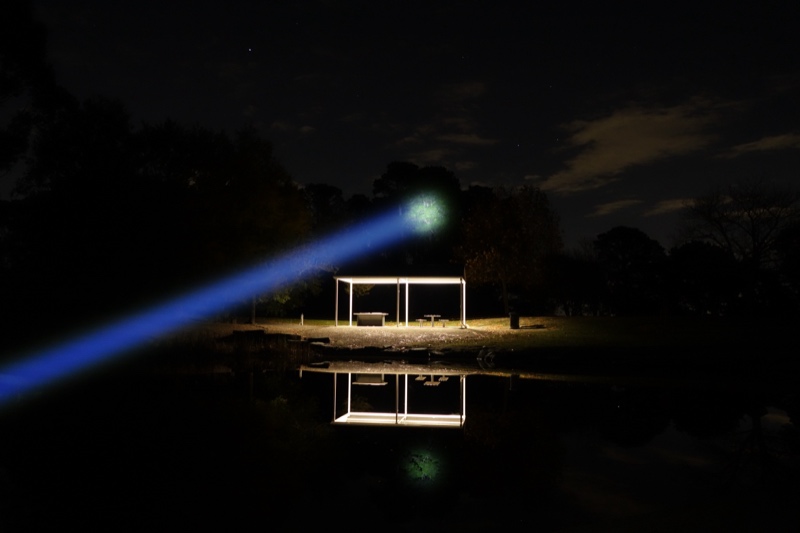
Vastlite Bow (High)#
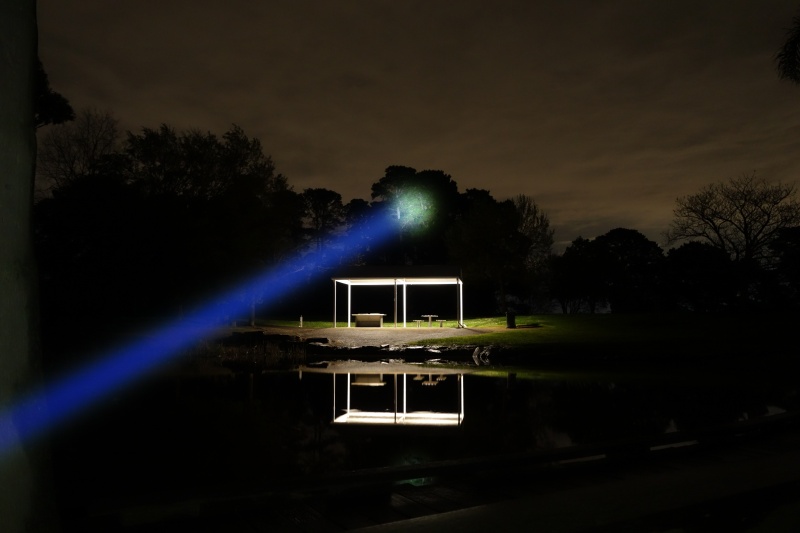
NLIGHTD L2 (High)#
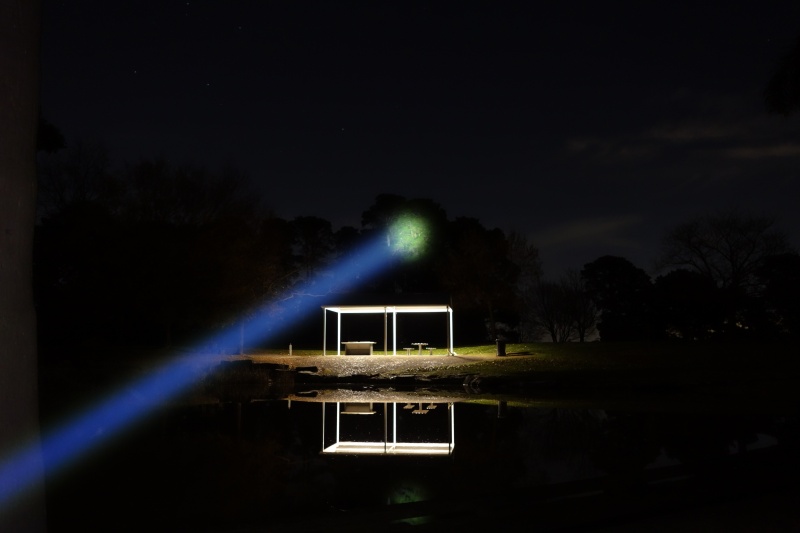
NLIGHTD L3 (High)#
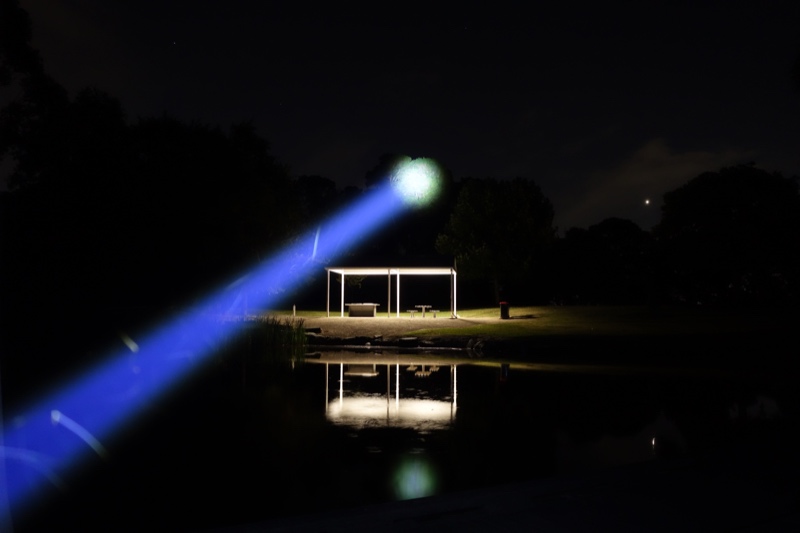
Lumintop Petal (LEP High)#
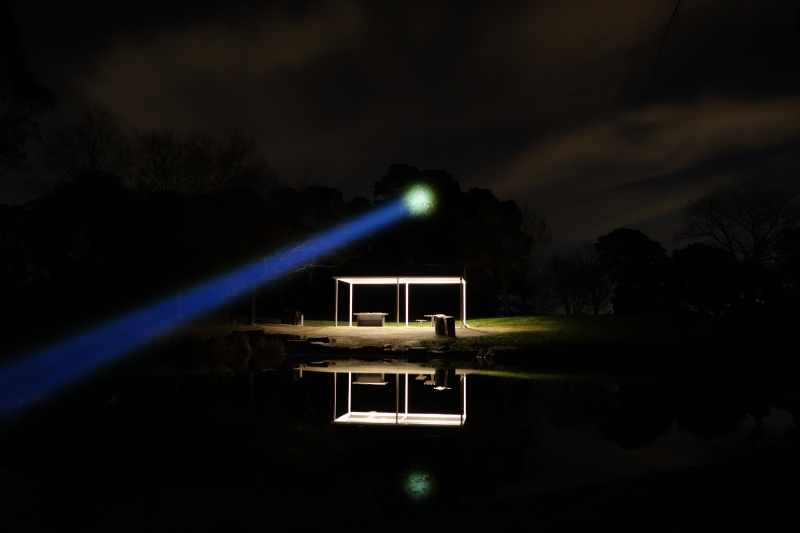
Thermal Images#
I used a Zoyi ZT-R01 IR Thermography Multimeter to take thermal images of the Vastlite Minima Bow on a silicone mat while using High.
Room temperature: 15 C
| Time (mm:ss) | Max Temperature |
|---|---|
| 00:00 | 16.0 C |
| 01:00 | 29.8 C |
| 02:00 | 31.2 C |
| 03:00 | 32.3 C |
| 04:00 | 34.7 C |
| 05:00 | 36.2 C |
Conclusion#
The Vastlite Minima Bow is such a tiny LEP torch!
The white beam looks nice at night.
It does not last long on High with such a small battery but it is what it is (a tiny LEP torch!).
If you are looking for a very small LEP torch then I can highly recommend the Vastlite Minima Bow.
Pros:#
- Tiny!
- It accepts a wide range of 16340 3.7V Li-ion cells.
- Good build quality.
- The white beam looks nice.
- Simple user interface.
- Output is well regulated.
- Low voltage protection.
Cons:#
- High output drops within 2 minutes.
- Oval shaped hot spot on Low.
Price#
The Vastlite Minima Bow is AU$143.10 from flashlightgo.com after applying a promo code.
Product page#
Promo code: TIM
Vastlite Minima Bow at flashlightgo.com
I may earn a commission if you use an affiliate link or a promo code. This will help fund future torch reviews and tutorials.
